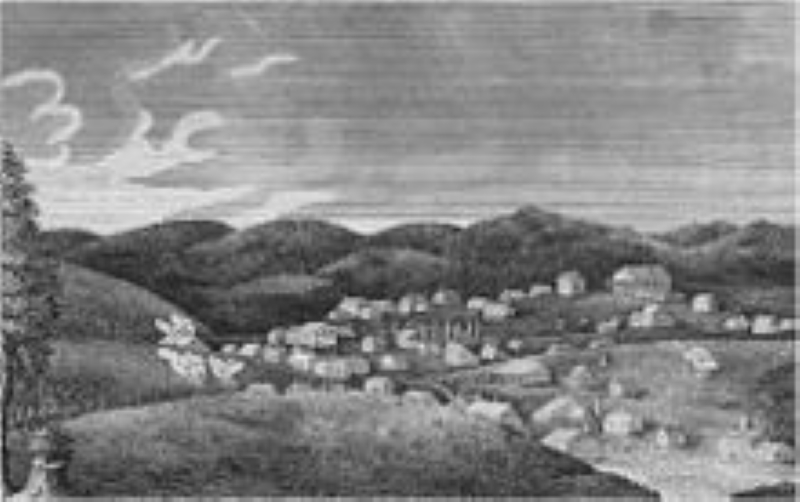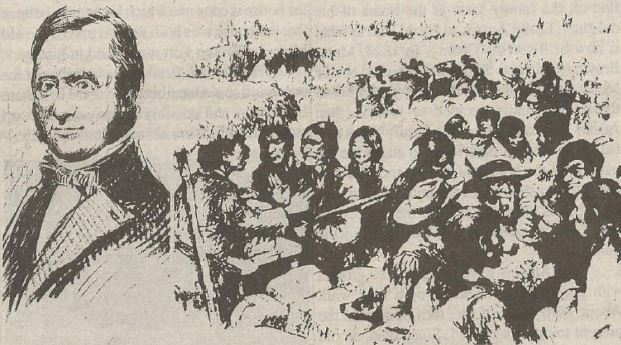Missouri’s First Industry!
Washington County has been key in the expansion and growth of American industry. In fact, Missouri’s FIRST INDUSTRY started right here in the late 1700s. During the 18th century, at the time of the Industrial Revolution, Potosi opened the door to the West. Historically, our roots are buried in our mines and in our spirit to lead.

From the beginning
Washington County has been key in the expansion and growth of American industry. During the 18th century, at the time of the Industrial Revolution, Potosi opened the door to the West. Historically, our roots are buried in our mines and in our spirit to lead.

And, we learned it first from the French.
French missionaries, explorers, fur trappers, tradesmen, and entrepreneurs in search of the lead minerals, canvassed the area as early as the 1600’s. French settlements still impact our culture — and names. The earliest settlements throughout Washington County are still recognized as “Mine Au Breton” or Potosi, “Cabanage de Renaudiere” or Old Mines (north of Potosi) and “Fourche Au Renault” now part of Sunnen Lake thanks to Philippe Francois Renault, a wealthy Frenchman from an iron-mining family who worked this area for over 20 years before returning to France in 1742, leaving many of his workers here to establish lives and grow families in their new home.
And, we learned it first from the French.
French missionaries, explorers, fur trappers, tradesmen, and entrepreneurs in search of the lead minerals, canvassed the area as early as the 1600’s. French settlements still impact our culture — and names. The earliest settlements throughout Washington County are still recognized as “Mine Au Breton” or Potosi, “Cabanage de Renaudiere” or Old Mines (north of Potosi) and “Fourche Au Renault” now part of Sunnen Lake thanks to Philippe Francois Renault, a wealthy Frenchman from an iron-mining family who worked this area for over 20 years before returning to France in 1742, leaving many of his workers here to establish lives and grow families in their new home.

2023 marked the 300th anniversary for the Old Mines settlement!
Local historians worked hard and celebrated all year long through multiple events. Incredibly, the mining community was established in 1723…

2023 marks the 300th anniversary for the Old Mines settlement!
Currently, locals are working hard and looking forward to celebrating all year long through multiple events. Incredibly, the mining community was established in 1723…
And the mining had just begun.
We will let portions from “The Miner’s Prospect” tell more of the story, because the reality is, the way west began right here in Potosi, Mo. Our history is shared and celebrated during the Moses Austin Heritage Festival every summer in downtown Potosi.
And the mining had just begun.
We will let portions from “The Miner’s Prospect” tell more of the story, because the reality is, the way west began right here in Potosi, Mo. Our history is shared and celebrated during the Moses Austin Heritage Festival every summer in downtown Potosi.
Mining is such a huge part of our local story, breeding a solid work ethic, growth mindset and prosperity in our region. “The Miner’s Prospect” explains…
Mining is such a huge part of our local story, breeding a solid work ethic, growth mindset and prosperity in our region. “The Miner’s Prospect” explains…
And then came Moses.
Word of our area’s potential for wealth spread to a Connecticut Yankee, importer, miner and entrepreneurial genius named Moses Austin.
Moses Austin in 1798 turned lead mining and smelting into Missouri’s first major industry, and in the 20 years following 1804, lead produced in Washington County nearly equaled in value the purchase price of the Louisiana Purchase.

And then came Moses.
Word of our area’s potential for wealth spread to a Connecticut Yankee, importer, miner and entrepreneurial genius named Moses Austin.
Moses Austin in 1798 turned lead mining and smelting into Missouri’s first major industry, and in the 20 years following 1804, lead produced in Washington County nearly equaled in value the purchase price of the Louisiana Purchase.

Our rich history and the legacy of our founder is still celebrated during the Moses Austin Heritage Festival every summer in downtown Potosi. Moses’ son, Stephen Austin, carried his father’s ambitions south and eventually founded Austin, Texas. So, Potosi has been referred to as “The Cradle of Texas.”
We are proud to have the connection.
As surface lead was exhausted, lead production went deep and wide, expanding to the Washington County surface lead “boom” in the Palmer area in the 1890’s and in the deep shafts of St. Joe Lead Company, now The Doe Run Company, when lead was discovered at the Indian Creek Mine in Ebo in 1948.
“Barite Capital of the World” described the era from the 1860’s to the 1920’s when barite or “tiff” was found to be a mineral asset of the area. Later, zinc and iron were also mined and a huge discovery led to the opening of St. Joe Mineral’s Pea Ridge Mine, which was the nation’s only underground iron mine.
Our rich history and the legacy of our founder is still celebrated during the Moses Austin Heritage Festival every summer in downtown Potosi. Moses’ son, Stephen Austin, carried his father’s ambitions south and eventually founded Austin, Texas. So, Potosi has been referred to as “The Cradle of Texas.”
We are proud to have the connection.
As surface lead was exhausted, lead production went deep and wide, expanding to the Washington County surface lead “boom” in the Palmer area in the 1890’s and in the deep shafts of St. Joe Lead Company, now The Doe Run Company, when lead was discovered at the Indian Creek Mine in Ebo in 1948.
“Barite Capital of the World” described the era from the 1860’s to the 1920’s when barite or “tiff” was found to be a mineral asset of the area. Later, zinc and iron were also mined and a huge discovery led to the opening of St. Joe Mineral’s Pea Ridge Mine, which was the nation’s only underground iron mine.
As the years have passed, Washington County has changed.
We’ve grown. We’ve become more prosperous. We’ve benefited with each generation as brave and ambitious leaders have adapted and learned, innovated and made progress. The legacy of Austin lives on because people have always made the difference here.
Today, we are proud of our rich heritage and confident that our strong work-ethic, desire to succeed and love for this land remain…and that will never change.
As the years have passed, Washington County has changed.
We’ve grown. We’ve become more prosperous. We’ve benefited with each generation as brave and ambitious leaders have adapted and learned, innovated and made progress. The legacy of Austin lives on because people have always made the difference here.
Today, we are proud of our rich heritage and confident that our strong work-ethic, desire to succeed and love for this land remain…and that will never change.
